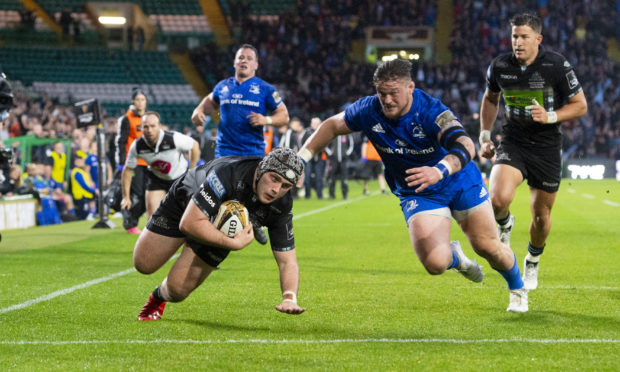If there’s consolation for Glasgow Warriors fans in the wake of their 18-15 loss to Leinster in Saturday’s Guinness PRO14 final, it’s that only the last two European champions could beat their team when it really mattered this year.
It means, arguably, Glasgow are one of the top three teams in Britain and Ireland, and in the top five in Europe. Not bad.
Only…they are a good way third. Despite going toe to toe with Saracens and Leinster over the last three seasons, they’ve lost every one of those games when the teams have both been at full strength.
Saturday was the closest they’ve got, but it didn’t feel as close as the scoreline. Grant Stewart’s thrilling sprint down the touchline for the try five minutes from the end had the Warriors’ legions in the Celtic Park stands hoping desperately, but it really was already too late.
Leinster, once in possession of the ball and “latching” support players on to the ball carrier to make it almost impossible to scavenge and compete for possession, simply sat on the game, as they had done for much of the second half.
(As an aside, this “latching” practice was a staple used by Munster to kill games for several years before being outlawed, only for it to creep back into the game like a weed. World Rugby badly need to sort it out again.)
Dave Rennie correctly identified the key to the game as not being Garry Ringrose’s try from a charge down which seemed to defy the laws of known physics to stay in play, nor the taking out of Stuart Hogg in the air and from the game by Rob Kearney.
Instead, it came midway through the first half with the score 7-5, when the impressive Kyle Steyn made a half-break and suddenly Hogg and DTH van der Merwe had a two-on-one, but they allowed Jordan Larmour to get between them and disrupt.
After a couple more phases Glasgow had a two-man overlap on the right, but didn’t see it. Then Adam Hastings had a man over but chose to go himself and was felled by Robbie Henshaw.
Three try-scoring chances, one after the other, in the space of a minute or two. Glasgow settled for a penalty, but “14-5 looks a whole lot better than 10-5,” said Rennie afterwards, and even fleeting opportunities like these simply have to be taken against teams like Leinster.
Leinster head coach Leo Cullen made a good point afterwards, saying whichever side got ahead in the saturated conditions was likely to control the game. Which is what his side did in the second half, much in the manner of Ireland in the Six Nations game at Murrayfield in February.
There were bright spots for Glasgow. First and foremost was seeing 47,000 fans – on a day when there was a football final in the city as well – screaming for their team from the Celtic Park stands. For those of us who used to be among the 1500 at Hughenden when the Warriors started this journey 15 years ago, it was affirming and astonishing at the same time.
On the pitch, Scott Cummings and Kyle Steyn may have played their way into the Rugby World Cup training squad with outstanding performances. The Fagerson brothers were immense.
Only Hogg is leaving from this matchday squad. It’s a big loss, for sure, and if anything the talisman’s departing game was even worse than Finn Russell’s similarly deflating farewell last year. Both deserved better, but these things are rarely just.
Gregor Townsend, the Scotland head coach, was an interested observer looking somewhat grim at the end of the game – naturally, as a former Glasgow coach, he was hoping for his former charges to win.
But maybe he was also thinking about many of these players facing each other again in Yokohama in September in the opening Rugby World Cup match, and the difficulty of figuring out a way to beat these formidable Irish.


